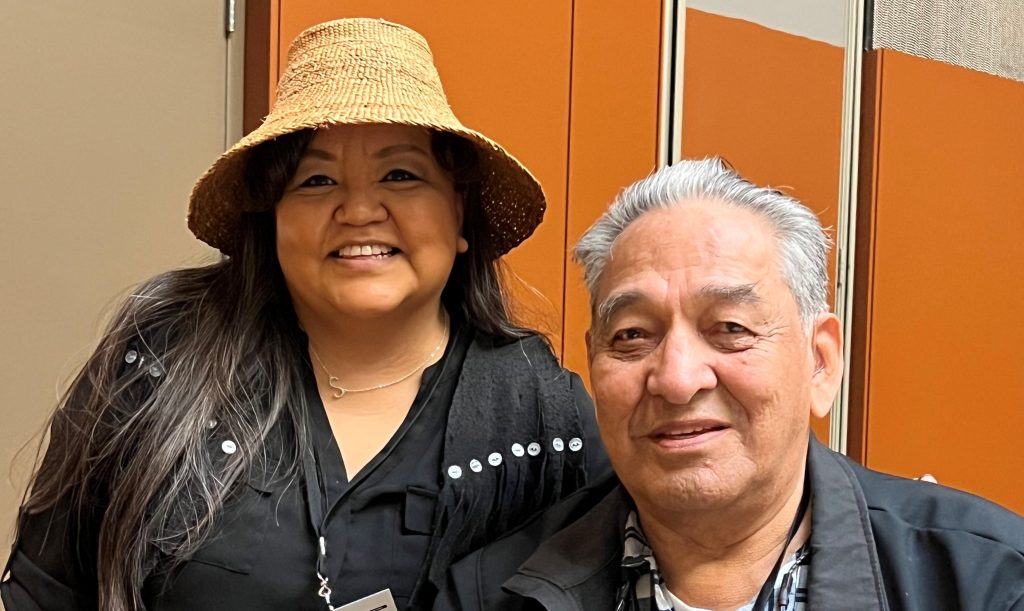Podcast: Play in new window | Download | Embed
The 40th annual Statewide Elders and Youth Conference kicked off Sunday at the Dena’ina Center in downtown Anchorage.
People from all over Alaska have come to town to take part in the four-day event, as well as the Alaska Federation of Natives convention that will take place later this week.
This is the third time Joseph Johnson Sr. from Angoon has taken part in the conferences. He said it is very important for elders and youth to come together.
“Get all the young kids and everyone together as a group and then split them up where they can talk, and tell other people what’s going on in their community that makes it very interesting.”
Anne Stepetin from Juneau escorted five elders to Anchorage.
She said the children can be a healing source for the elders.
“It is bringing an elder into a space where they can have healing because a lot of our elders have faced a lot of traumas in their life. We have a lot of generational trauma and I’m a huge believer in connecting our youth with our elders, and the youth bring a lot of healing to our elders.”
Those who attended Monday and Tuesday heard keynote speeches from elder Delores Churchill, the last remaining Haida birth speaker in the state, and Indigenous land protector and model Quannah Chasinghorse.

USDA Office of Tribal Relations Director Heather Dawn Thompson, left, USDA Under Secretary for Marketing and Regulatory Programs Jenny Lester Moffitt and Food Safety, and Inspection Service Administrator Paul Kiecker announce a new bison purchase pilot program for tribal feeding programs. (Photo: Lee Strubinger / SDPB)
The U.S. Department of Agriculture (USDA) is awarding half a million dollars in contracts to four tribal buffalo producers located within South Dakota.
The move is part of what the agency hopes will offer more ground bison meat for tribal communities.
SDPB’s Lee Strubinger has more.
Officials with the USDA say they want to change how the agency purchases and delivers bison to local communities.
The agency is announcing a pilot program they say will offer more ground bison to communities through the Food Distribution Program on Indian Reservations (FDPIR).
It seeks to align purchasing timeframes with how ranchers manage bison herds.
Heather Dawn Thompson is the USDA Director of Tribal Relations and an enrolled member of the Cheyenne River Sioux Tribe.
She says the program will benefit local producers who want to sell meat to the federal government.
“It’s very challenging to be able to sell to the federal government as a small producer. South Dakota has lots of small and family producers. This provides an opportunity for those producers to really participate in the federal procurement process.”
Thompson says the program will benefit communities near bison herds that receive provisions from federal food initiatives.
The USDA awarded contracts to four tribally owned herds and managers in the Cheyenne River, Rosebud, Lower Brule, and Standing Rock Reservations.

Students participated in a Buffalo harvest experience facilitated by the Cheyenne River Sioux Tribe Buffalo corporation and Laplante school. (Courtesy Cheyenne-Eagle Butte Schools)
Jenny Moffit is an Under Secretary with the USDA, who oversees purchasing at USDA.
She says bison present a unique challenge when it comes to federal food distribution.
“There are certain times of year when bison are harvested. If we’re buying year-round and expecting and asking for full truck loads worth of bison and that’s something producers can meet, they’re not able to participate in these programs. That is such a miss.”
The USDA says it will align purchase timeframes with infrequent animal handling, traditional field harvests, and a nature-based calendar.
The agency says it will take lessons learned from the pilot to take the program further in the future.
Get National Native News delivered to your inbox daily. Sign up for our newsletter today.



